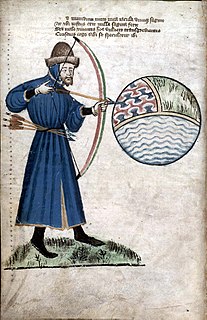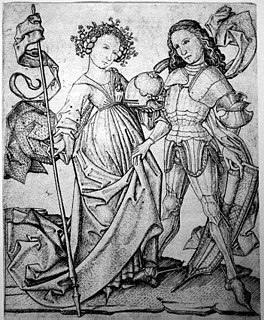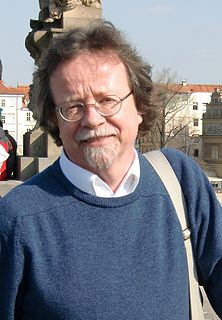
Geoffrey Chaucer was an English poet, author, and civil servant best known for The Canterbury Tales. He has been called the "father of English literature", or, alternatively, the "father of English poetry". He was the first writer to be buried in what has since come to be called Poets' Corner, in Westminster Abbey. Chaucer also gained fame as a philosopher and astronomer, composing the scientific A Treatise on the Astrolabe for his 10-year-old son Lewis. He maintained a career in the civil service as a bureaucrat, courtier, diplomat, and member of parliament.

In metaphysics, nominalism is the view that universals and abstract objects do not actually exist other than being merely names or labels. There are at least two main versions of nominalism. One version denies the existence of universals – things that can be instantiated or exemplified by many particular things. The other version specifically denies the existence of abstract objects – objects that do not exist in space and time.

The problem of universals is an ancient question from metaphysics that has inspired a range of philosophical topics and disputes: Should the properties an object has in common with other objects, such as color and shape, be considered to exist beyond those objects? And if a property exists separately from objects, what is the nature of that existence?

William of Ockham was an English Franciscan friar, scholastic philosopher, and catholic theologian, who is believed to have been born in Ockham, a small village in Surrey. He is considered to be one of the major figures of medieval thought and was at the centre of the major intellectual and political controversies of the 14th century. He is commonly known for Occam's razor, the methodological principle that bears his name, and also produced significant works on logic, physics and theology. William is remembered in the Church of England with a commemoration on 10 April.

Pandarus or Pandar is a Trojan aristocrat who appears in stories about the Trojan War.

Chrétien de Troyes (ModernFrench: [kʁetjɛ̃ d tʁwa]; Old French: Crestien de Troies[kresˈtjẽn də ˈtrojəs]; was a French poet and trouvère known for his writing on Arthurian subjects, and for first writing of Lancelot, Percival and the Holy Grail. Chrétien's works, including Erec and Enide, Lancelot, Perceval and Yvain, represent some of the best-regarded of medieval literature. His use of structure, particularly in Yvain, has been seen as a step towards the modern novel.

John Gower was an English poet, a contemporary of William Langland and the Pearl Poet, and a personal friend of Geoffrey Chaucer. He is remembered primarily for three major works, the Mirour de l'Omme, Vox Clamantis, and Confessio Amantis, three long poems written in French, Latin, and English respectively, which are united by common moral and political themes.

Marsilius of Inghen was a medieval Dutch Scholastic philosopher who studied with Albert of Saxony and Nicole Oresme under Jean Buridan. He was Magister at the University of Paris as well as at the University of Heidelberg from 1386 to 1396.

Troilus and Criseyde is an epic poem by Geoffrey Chaucer which re-tells in Middle English the tragic story of the lovers Troilus and Criseyde set against a backdrop of war during the siege of Troy. It was written in rime royale and probably completed during the mid-1380s. Many Chaucer scholars regard it as the poet's finest work. As a finished long poem it is more self-contained than the better known but ultimately unfinished The Canterbury Tales. This poem is often considered the source of the phrase: "all good things must come to an end" (3.615).

Troilus is a legendary character associated with the story of the Trojan War. The first surviving reference to him is in Homer's Iliad, which some scholars theorize was composed by "bards" (aoidoi) and sung in the late 9th or 8th century BC.
Ralph Strode, English schoolman, was probably a native of the West Midlands.

Occamism is the philosophical and theological teaching developed by William of Ockham (1285–1347) and his disciples, which had widespread currency in the 14th century.
Chaucer's influence on 15th-century Scottish literature began towards the beginning of the century with King James I of Scotland. This first phase of Scottish "Chaucerianism" was followed by a second phase, comprising the works of Robert Henryson, William Dunbar, and Gavin Douglas. At this point, England has recognised Scotland as an independent state following the end of the Wars of Scottish Independence in 1357. Because of Scottish history and the English’s recent involvement in that history, all of these writers are familiar with the works of Geoffrey Chaucer.

The Testament of Cresseid is a narrative poem of 616 lines in Middle Scots, written by the 15th-century Scottish makar Robert Henryson. It is his best known poem. It imagines a tragic fate for Cressida in the medieval story of Troilus and Criseyde which was left untold in Geoffrey Chaucer's version. Henryson's cogent psychological drama, in which he consciously resists and confronts the routine depiction of Cressida (Cresseid) as simply 'false', is one of the features that has given the poem enduring interest for modern readers and it is one of the most admired works of northern renaissance literature. A modern English translation by Seamus Heaney, which also included seven of Henryson's fables from The Morall Fabillis, was published in 2009.
Wolfgang Clemen was an eminent German literary scholar who helped reestablish English Studies in Germany after World War II. His father, Paul Clemen, was a well-known art historian.
Amoryus and Cleopes is a poem written in 1449 by John Metham; it was an early English adaptation of the Pyramus and Thisbe narrative from Book 4 of Ovid‘s Metamorphoses.

Christoph Bode is a literary scholar. His fields are British and American literature, comparative literature, literary theory, narratology, and travel writing. He is full professor and chair of Modern English literature in the Department of English and American Studies at Ludwig-Maximilians-Universität München. Since 2009, Bode has been a reviewer and occasional columnist for Times Higher Education.

Troy Book is a Middle English poem by John Lydgate relating the history of Troy from its foundation through to the end of the Trojan War. It is in five books, comprising 30,117 lines in ten-syllable couplets. The poem's major source is Guido delle Colonne's Historia destructionis Troiae.
Richard Utz is a German-born medievalist who has spent much of his career in North America. He specializes in medieval studies, and served as President of the International Society for the Study of Medievalism (2009–2020).
Alastair J. Minnis is a Northern Irish literary critic and historian of ideas who has written extensively about medieval literature, and contributed substantially to the study of late-medieval theology and philosophy. Having gained a first-class B.A. degree at the Queen's University of Belfast, he matriculated at Keble College, Oxford as a visiting graduate student, where he completed work on his Belfast Ph.D., having been mentored by M.B. Parkes and Beryl Smalley. Following appointments at the Queen's University of Belfast and Bristol University, he was appointed Professor of Medieval Literature at the University of York; also Director of the Centre for Medieval Studies and later Head of English & Related Literature. From 2003 to 2006, he was a Humanities Distinguished Professor at Ohio State University, Columbus, from where he moved to Yale University. In 2008, he was named Douglas Tracy Smith Professor of English at Yale. He retired in 2018, and is now living in the Scottish Borders. Professor Minnis is a Fellow of the English Association, UK (2000), a Fellow of the Medieval Academy of America (2001), and an Honorary Member of the Royal Irish Academy (2016). From 2012 to 2014, he served as President of the New Chaucer Society. Currently, he is Vice-President of the John Gower Society. He was General Editor of the Cambridge University Press series Cambridge Studies in Medieval Literature from 1987 to 2018, and holds an honorary master's degree from Yale (2007) and an honorary doctorate from the University of York (2018). The University of York also bestowed on him the honorific title of Emeritus Professor of Medieval Literature (2018).